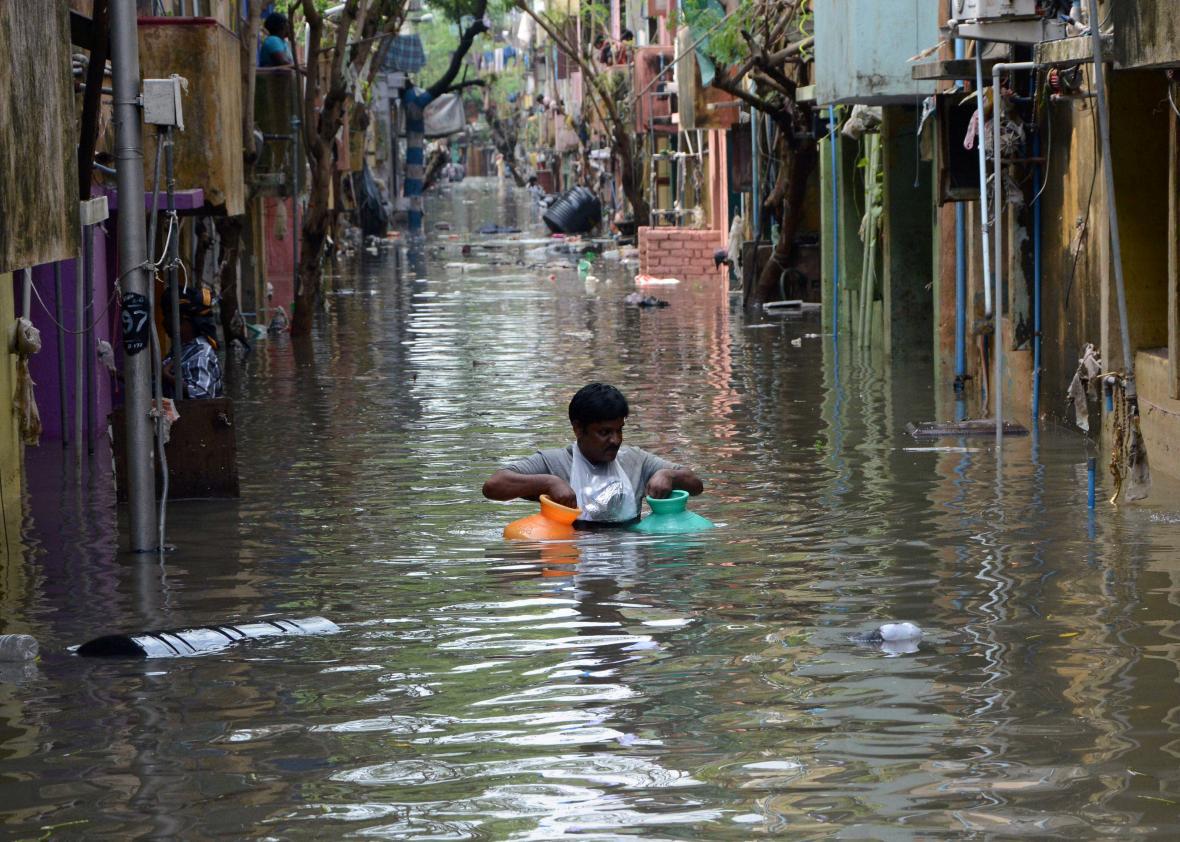Climate change is going to mean more (and often worse) extreme weather events like torrential rains, droughts, and hurricanes. These will often prove catastrophic for regions that do not have the capacity to cope.
So can we blame climate change for the disasters these extreme weather events leave in their wake?
That’s been suggested about the ongoing war in Syria. A well-cited article published in the Proceedings of National Academy of Sciences suggests that an unprecedented drought accentuated frustration with the Assad regime and led to migration from rural to urban areas. This paper, and the resulting news coverage, has led to many people to making the connection: Prince Charles, former presidential candidate Martin O’Malley, and Thomas Friedman have all suggested climate change might be to blame for Syria’s war.
But the actual paper makes the link between the drought, existing policy failures, and the conflict seem rather contingent:
Thus, the migration in response to the severe and prolonged drought exacerbated a number of the factors often cited as contributing to the unrest, which include unemployment, corruption, and rampant inequality. The conflict literature supports the idea that rapid demographic change encourages instability. Whether it was a primary or substantial factor is impossible to know, but drought can lead to devastating consequences when coupled with preexisting acute vulnerability, caused by poor policies and unsustainable land use practices in Syria’s case and perpetuated by the slow and ineffective response of the Assad regime [emphasis added].
While climate change–induced drought may have contributed, the heart of the war probably lies in the long history of conflict between Shiites and Sunnis coupled with the problematic 2003 U.S. invasion of Iraq that pushed more than a million refugees from Iraq to Syria. But if we keep on harping on climate change as the important causal factor, it becomes easier to ignore the Shiite-Sunni struggle that is playing out in countries other than Syria as well. Of course, even if the world were to dramatically reduce its greenhouse gas emissions to keep the temperature rise below 2 degree Celsius, as agreed in the Paris Agreement of 2015, Syrian conflicts and other conflicts will not go away.
This becomes problematic, as there are times when natural disasters require clear indication of who is to blame for the problem. For example, a landslide in Oso, Washington, killed 43 people in March 2014. It’s true that the Pacific Northwest is prone to landslides, and it also receives a lot of rain—118 inches annually on the western slope of the Cascades. While climate change will probably increase the number and intensity of heavy showers, leading to more frequent landslides, intensive logging and government negligence in permitting new construction in these areas cause the real disasters. In fact, a 2010 study commissioned by the county to comply with the requirements of the federal Disaster Mitigation Act had warned of the danger of mudslides in this area. Arguably, the county should have disallowed development but did not. In October of this year, the state of Washington and Grandy Lake Forest Associates, the timber company that logged the area, acknowledged their negligence and agreed to pay $60 million in damages to survivors.
We should guard against blaming Oso on climate change. Such events are more of an indication of discreet problems, often caused by government and private actors behaving irresponsibility and neglecting their due diligence in scenarios that would have allowed their communities to better cope with extreme weather events. It is the government and timber companies that should pay. If anything, they should be held to even higher standards, thanks to the increased risk posed by climate change.
When heavy rains in Chennai, India, in December caused massive floods, CNN wrote, “Chennai Floods a Climate Change Wake-Up Call for World.” The consequences of the flooding were horrendous: about 300 dead, massive economic dislocation, and disease outbreaks. While global warming probably accentuated the torrential rains, it was actually policy failures that allowed heavy rains to cause the flood and human suffering: Over the past two decades, the city government has systematically disregarded basic principles of ecology and urban planning by building structures in flood plains and marshlands. For example, an international airport and the information technology corridor are constructed on flood plains. During the flooding they went under. It may be true that the floods should help people realize the dangers of global warming. Climate change is real and will cause serious suffering, which is why we as a society should take steps to address it. But the suffering that will result is not just the fault of climate change—it is often also the result of bad policy.
Climate change is often going to be the domino that falls. But that does not mean we can ignore the rest of the dominos in the row. Doing so is tempting and perhaps advantageous: Climate change is a big, messy problem for which a specific individual or government cannot be held accountable (even though human actions are certainly to blame). Blaming climate change for flooding makes it easier to escape responsibility for not enforcing zoning laws or allowing development on flood plains. But this is not sound policy.
In the case of Syria, it is certainly important to realize that climate change–exacerbated drought was one of the contributing factors—perhaps even the match that lit the kindling. But it does not mean there was no kindling to begin with.
We must be vigilant against climate change scapegoating tendencies when there are other clear issues contributing to these disasters. Allowing such rhetoric could make it easier to avoid fixing the underlying causes, a move that would be catastrophic.
After all, if we know anything, it’s that climate change will make such problems worse.
